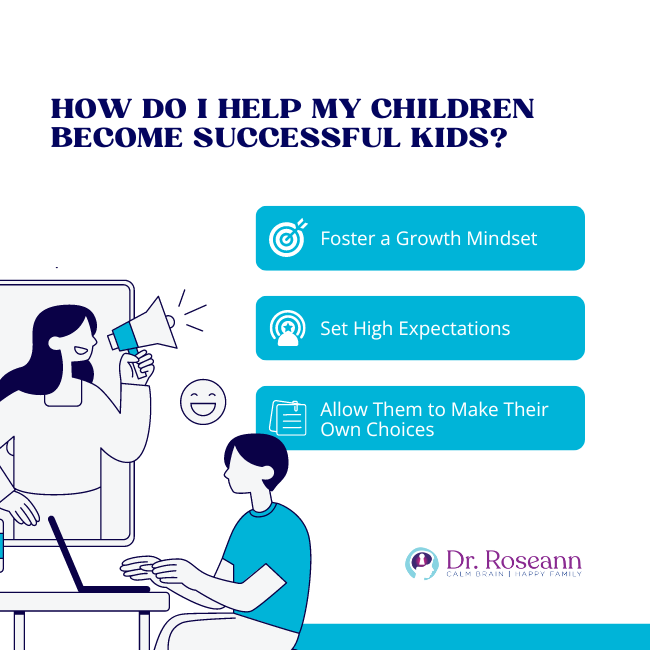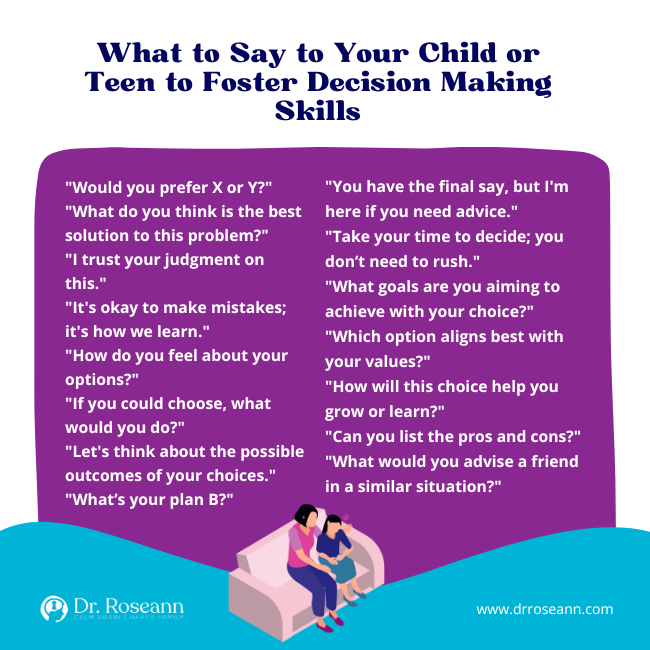Every day, parents worldwide ask me, “How can I help my child be successful?” Sometimes, it is about a two-year-old, and other times, it is about a twenty-seven-year-old. Our kids are our kids no matter their age; sometimes, they have hurdles to overcome to succeed.
Well, I have never been more concerned about children’s and teen’s mental health than I am right now. I am downright scared for kids and their parents. The world is hurting, and parents are overwhelmed. We can do better for all children and their families.
That is why I formed The Global Institute of Children’s Mental Health just before the pandemic in January 2020. I have done hundreds of television shows, podcasts, and top-tier publications. I want parents to know, “It’s Gonna Be OK! ™” and I am here to show them how to cultivate confidence, resilience, and grit. Those critical components to success will serve our kids today and for the rest of their lives.
How Do I Help My Children Become Successful Kids?
I get it. We lead busy lives. We have been working a lot during this pandemic and doing double shifts even! No spa days, no vacations, heck, no five minutes alone. You want tools that help your kids listen, pay attention, and do better in school, and that is precisely what I am all about. Plus, they will be happier, more self-confident, and independent without nagging!

Here are some practical parenting advice to help you raise successful children:
1. Foster a Growth Mindset
Research shows that kids with a growth mindset – the belief that abilities can be developed through dedication and hard work – are more likely to become successful adults (Carol S. et al., 2014).
Encourage your children to embrace challenges, learn from mistakes, and persevere despite setbacks. Instead of praising intelligence or talent, praise their effort and resilience. Doing so builds their grit and perseverance.
2. Set High Expectations
Believe in your child's abilities and set high yet achievable expectations. When kids understand your faith in their capabilities, they develop a positive attitude toward learning and achievement. Encourage them to stretch beyond their comfort zones and provide support and guidance as they tackle new challenges.
Fostering a sense of self-belief and a willingness to embrace difficulties empowers your child to develop resilience and confidence in their ability to overcome obstacles on the path to success, not just in school but in life (Jamie Victoria Barnes, 2020).
3. Allow Them to Make Their Own Choices
While it's crucial to offer guidance, granting your children the autonomy to make their own decisions is equally essential. You foster independence and self-assurance by empowering them to choose from a young age.
This process strengthens their decision-making skills and instills a sense of ownership and responsibility. It prepares them for the challenges they'll encounter as they grow and navigate the world independently.

4. Encourage Independence
Teaching your kids essential life skills is a cornerstone of fostering independence. As they mature, gradually entrust them with more responsibilities, such as household chores like doing their own laundry to managing their finances.
These experiences build practical competence and instill a sense of pride and self-worth as they realize their capabilities and contributions to the family unit. Empowering them to take ownership of tasks and make decisions equips them with valuable tools for success in their personal and professional lives.
5. Be a Role Model
Children learn by example, so strive to model the traits and behaviors you want to instill. Show them the importance of hard work, perseverance, and self-discipline through your actions. Let them see you tackle challenges with determination and a positive mindset.
When they witness you overcoming obstacles with resilience and grace, they'll be inspired to do the same in their own lives. Remember, you are your child's first and most influential teacher, so lead by example and watch them flourish as they follow in your footsteps.
6. Emphasize the Importance of Education
Nurturing a love for learning is paramount in your child's development. Encourage curiosity by exposing them to diverse experiences, whether visiting museums, exploring nature, or trying new hobbies.
Teach them that education extends beyond the confines of the classroom. Emphasize the value of lifelong learning and the pursuit of knowledge for personal growth and fulfillment. Instilling this mindset early on empowers your children to embrace learning as a lifelong journey filled with endless possibilities and opportunities for self-discovery.
7. Foster Strong Relationships
Cultivate a supportive and nurturing family environment where open communication and emotional expression are encouraged. Strong family relationships provide a solid foundation for children to explore the world confidently.
Remember, raising successful children is a journey filled with ups and downs. You can help your kids navigate life's challenges and achieve their full potential with patience, love, and consistent support.
As you raise successful children, remember you need not be alone in the journey. Download the Natural Solutions Parent Kits for invaluable resources and guidance. These kits will equip you with tools to nurture your child's mental health and well-being. Empower your family and unlock your child's full potential with the right tools at your fingertips.
How do you build self esteem in children?
Building self-esteem in children involves providing unconditional love, encouragement, and opportunities for success. Offer praise for their efforts and achievements while allowing them to make choices and decisions independently, fostering a sense of competence and worth.
How do you go about teaching kids to develop self-confidence?
Teaching kids to develop self-confidence involves providing support, encouragement, and opportunities for them to try new things and succeed. Offer praise and positive reinforcement while helping them set achievable goals and overcome challenges, building their belief in their abilities over time.
What's the best parenting advice for those with a young child?
The best parenting advice for a young child is to provide a loving and nurturing environment, establish clear boundaries and routines, and actively engage in their development through play and exploration. Additionally, prioritize open communication, patience, and consistency in your interactions, fostering a strong bond and sense of security.
How can so many parents raise kids to become successful adults?
So many parents can raise kids to become successful adults by instilling values of resilience, responsibility, and lifelong learning. By setting high expectations, providing support and guidance, and fostering a growth mindset, parents can empower their children to navigate challenges, pursue their passions, and achieve their full potential in adulthood.
How important is a growth mindset and positive attitude for successful people?
A growth mindset and positive attitude are crucial for successful people as they foster resilience, creativity, and a willingness to learn and adapt. Embracing challenges as opportunities for growth, maintaining optimism in the face of setbacks, and believing in one's ability to improve are essential components of success and fulfillment in life.
What is helicopter parenting as defined by a developmental psychologist?
Helicopter parenting, as defined by developmental psychologists, refers to a parenting style characterized by overinvolvement, excessive control, and constant hovering over children's lives. This approach often involves parents micromanaging their children's activities, decisions, and experiences, which can hinder the development of independence, resilience, and problem-solving skills.
Citations
Carol S., D., Gregory M, W., & Geoffrey L., C. (2014). Academic Tenacity: Mindsets and Skills that Promote Long-Term Learning. ERIC; Bill & Melinda Gates Foundation. https://eric.ed.gov/?id=ED576649
Jamie Victoria Barnes. (2020). Building Confidence, Resilience and Emotional Intelligence in Young Children. Jessica Kingsley.
Dr. Roseann is a mental health expert in Children’s Mental Health who frequently is in the media:
- Break the Rules Podcast Overcoming Anxiety & Mental Health Disorders.
- Reconditioned with Laurie Vaknine (Podcast) Managing Anxiety & Mental Health in Children.
- The Mack Talks Podcast Topic: Fighting the Stigma of Mental Health & Lyme Disease with Dr. Roseann
Always remember… “Calm Brain, Happy Family™”
Disclaimer: This article is not intended to give health advice and it is recommended to consult with a physician before beginning any new wellness regime. *The effectiveness of diagnosis and treatment vary by patient and condition. Dr. Roseann Capanna-Hodge, LLC does not guarantee certain results.
Are you looking for SOLUTIONS for your struggling child or teen?
Dr. Roseann and her team are all about science-backed solutions, so you are in the right place!
Grab your complimentary copy of
147 Therapist-Endorsed Self-Regulation Strategies for Children: A Practical Guide for Parents
Dr. Roseann is a Children’s Mental Health Expert and Licensed Therapist who has been featured in/on hundreds of media outlets including The Mel Robbins Show, CBS, NBC, PIX11 NYC, Today, FORBES, CNN, The New York Times, The Washington Post, Business Insider, Women’s Day, Healthline, CNET, Parade Magazine and PARENTS. FORBES called her, “A thought leader in children’s mental health.”

She coined the terms, “Re-entry panic syndrome” and “eco-anxiety” and is a frequent contributor to media on mental health.
Dr. Roseann Capanna-Hodge has three decades of experience in working with children, teens and their families with attention-deficit hyperactivity disorder (ADHD), autism, concussion, dyslexia and learning disability, anxiety, Obsessive Compulsive Disorder (OCD), depression and mood disorder, Lyme Disease, and PANS/PANDAS using science-backed natural mental health solutions such as supplements, magnesium, nutrition, QEEG Brain maps, neurofeedback, PEMF, psychotherapy and other non-medication approaches.
She is the author of three bestselling books, It’s Gonna Be OK!: Proven Ways to Improve Your Child's Mental Health, The Teletherapy Toolkit, and Brain Under Attack. Dr. Roseann is known for offering a message of hope through science-endorsed methods that promote a calm brain.
Her trademarked BrainBehaviorResetⓇ Program and It’s Gonna be OK!Ⓡ Podcast has been a cornerstone for thousands of parents facing mental health, behavioral or neurodevelopmental challenges.
She is the founder and director of The Global Institute of Children’s Mental Health, Neurotastic™Brain Formulas and Dr. Roseann Capanna-Hodge, LLC. Dr. Roseann is a Board Certified Neurofeedback (BCN) Practitioner, a Board Member of the Northeast Region Biofeedback Society (NRBS), Certified Integrative Mental Health Professional (CIMHP) and an Amen Clinic Certified Brain Health Coach. She is also a member of The International Lyme Disease and Associated Disease Society (ILADS), The American Psychological Association (APA), Anxiety and Depression Association of America (ADAA) National Association of School Psychologists (NASP), International OCD Foundation (IOCDF).
© Roseann-Capanna-Hodge, LLC 2024










